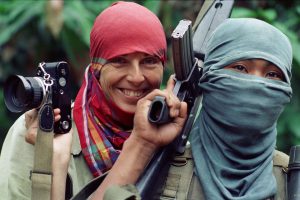‘It tasted like metal’
‘It tasted like metal’

Nettie Wild with a guerilla fighter
FILM REVIEW: A Rustling of Leaves (1988)
By Ysh Cabana
The Philippine Reporter
“These are my stories from inside the Philippine revolution,” the voiceover of director, writer and producer Nettie Wild plays over images of cane workers. “Their restless call for change resonates, like the sound of rustling of leaves in a distant, yet now familiar canefield.”
A Rustling of Leaves (1988) was first conceived when Nettie Wild started out as an actress after graduating from the University of British Columbia. She had traveled to the Philippines to perform street theatre, only to find herself doing theatre for the New People’s Army (NPA) in the mountains. She then returned to Canada to plan on making a documentary ‘from within.’
True to its subtitle Inside the Philippine Revolution, the documentary bears witness to the complexities and contradictions of a land that has been “the perpetual spoils of war.” Shot in 64,000 feet of film, the 16mm gives it a vintage vibe. It’s not the end of the narrative. “Of course, these stories when told, don’t stop,” says Wild in a pre-credit montage. It isn’t quite the fact that the movie reel is old but then it feels timeless. The actors who play themselves are still there framed within the portrait of a national turmoil.
The documentary features a spectrum of political actors from the extremist right, liberals, above-ground left, and the radicals. It is 1987, in the wake of the dictatorship of Ferdinand Marcos. Newly elected President Corazon Aquino deals with power struggle from her own military after the gruesome massacre of 13 protesting farmers in what would be known as Mendiola Massacre.
In Wild’s film, she follows the election campaign of Bernabe Buscayne, former commander of the NPA, who joined the bid for 1988 senate seat months after being released from political detention through Aquino’s amnesty. Ed dela Torre, also a former political prisoner and Catholic social activist, provides a “legal face” to the Left during the post-Marcos era from his Institute for Popular Democracy in Manila. “A democracy must have as many colours as the rainbow and there is no rainbow without red.”
Meanwhile, a young Ka Oris and rebel priest Father Frank Navarro continued the armed struggle in the countryside, where a “People’s Court” trial of a guerilla fighter is accused of snitching to the government the whereabouts of the revolutionaries.
The counterpoint comes from radio DJ Jun Pala the voice of the anti-Communist crusade and the vigilante Alsa Masa in Davao City. This is where then Col. Franco Calida also figures as his military crew patrol Agdao District, euphemistically called “Nicaragdao,” comparing it with Nicaragua. Also making an appearance is the young lieutenant and now senator Ronald ‘Bato’ dela Rosa.
They are reinforced by groups of armed religious, quasi-Christian cultists, such as the notorious Tadtad (chop to pieces) who tend to mutilate their victims. The said group is even shown in a photo carrying a head of a perceived communist.
“The fear was so intense, it tasted like metal,” said Wild in a more recent interview with University of the Philippines Professor Rolando Toledo. ‘Leaves’ still provides a sharp insight that the black-and-white in the political landscape is not as clear cut. The result is always a surprising look even after three decades since its world premiere. It’s an invitation for a deeper look in understanding the roots of armed conflict that plague the country until today that some are driven underground.
Hosted by Daang Dokyu film festival, ‘A Rustling of Leaves’ had its Philippine debut from September 19 to 21, 2020 surrounding the anniversary of the declaration of Marcos Martial Law.
Other featured documentaries are “Marcos: A Malignant Spirit” (1986), Lito Tiongson’s “Mendiola Massacre” (1987), Ramona Diaz’ “Imelda” (2003) and Kiri Dalena’s “Alunsina” (2020).
They are set for a rerun on the October 9 to 15 festival proper and can be seen on the Daang Dokyu website.
A Rustling of Leaves
Director/writer/producer: Nettie Wild; editor: Peter Wintonick; cinematographer: Kirk Tougas; camera assistant and 2nd unit cinematographer: Jojo Sescon; sound: Gael Maclean; music:
Joey Ayala, Salvador Ferreras, Rob Porter, David Byrne; producer: Robert Porter; executive producer: Christopher James. Rating: PG 13. In English and Bisaya (with English subtitles). Running time: 112 mins.
Starring: Bernabe Buscayno, Frank Navarro, Ed dela Torre, Jun Pala, Franco Calida, Ronald dela Rosa, Corazon Aquino
Comments (0)